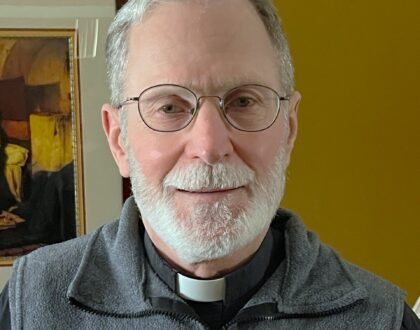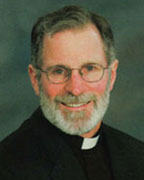Feast of the Most Holy Body and Blood of Christ

From The Pastor
The Feast of the Most Holy Body and Blood of Jesus honors and celebrates the living presence of the Lord Jesus in the Holy Eucharist. Like any great mystery, especially the mysteries of God, words can only fail the full meaning they try to convey. Yet, like the mystery of the Holy Trinity, faith in the Eucharist leads to greater understanding if we surrender to its meaning and purpose.
All the mysteries of God are more easily captured and understood through mature and active faith. No one will understand the Trinity by simply learning the sign of the Cross. No believer will know the true gift of the Eucharist by occasionally or passively attending Mass. To understand the mysteries of God, a believer must have a certain degree of willingness to surrender to the invisible yet tangible reality of God conveyed through an interaction of faith. Faith seeks understanding. To understand, one must yield to the unknown of a final ‘how does that work’ with a trust that only faith can provide.
Consider the deep love Jesus had for the disciples and his first followers. They lived with deep bonds of love. This kind of love they could not understand or put into words. No one had ever loved the way Jesus loved. Confused and perplexed as they were, they could not conceive of simply walking away due to a lack of understanding. They did not understand that Jesus had to die or that he would rise again. But he did. Lost in the trauma of his death and the fog of grief, two disciples walked blindly to Emmaus with Jesus only to recognize him in the breaking of the bread. They recalled the same bread Jesus broke and shared at the Last Supper as he offered his Body and Blood on the Cross to unite all believers in eternal unity. Why did they see/know him in the breaking of bread?
What is happening here? When God gave the Divine Self to the world through the Incarnation of the Lord Jesus, he gave his whole self. All that God is as the essence and fullness of love was given to us in the Lord Jesus. When Jesus, on the night before he died, broke bread and shared a cup, he made that bread and wine into his Body and Blood as a living covenant of his presence with us always. In the Eucharist, the whole self of God, given in the dying and rising of the Divine Son, remains ever-present. Jesus fulfills his promise to remain with us always mindful of our need to be in the communion of his love.
How is this mystery to be understood? A man’s flesh real food? A man’s blood real drink? Body means person or self. Jesus gives his whole self to us not only in dying and rising, but in the eternal promise to be with us always. Blood means life. In death, Jesus gives his life blood for the forgiveness of our sin. The surrendered life of Jesus on the Cross serves as the bond of communion God desires with all who believe in him. This is a love stronger than sin and death. Divine love through the Son gives new life.
The bonds of love Jesus had with the disciples and with all humanity was not a religious love. It was Divine love conveyed in full self-giving. It was a covenant love that longed to be received and accepted as a living relationship with all who seek the Divine way. The challenge to understand is because we measure Divine love against human love. This is not a comparable match. We are not God and we cannot love like God loves. Yet, we know God’s love and we long for it. We long to love and be loved like God loves, but human sin and selfishness get in the way.
People struggle with the reality of Real Presence. In our culture this is not a surprise. We live in a surface culture that hinders and sometimes directly blocks us from deep interior love, whole self-giving love. It is difficult to grasp the Real Presence of Jesus in the Eucharist when we have so few moments of real presence with ourselves or others. The Eucharist is the food of God that teaches us how to be present to the love of the risen Lord Jesus whose love we receive in the Eucharist. The presence of the love of Jesus in the Eucharist teaches us how to be present to God, to ourselves, and to others. Loves unites.
Consider the deepest bonds of love in your life. Who do you hold most dear and defend most ardently? How do you support that love? How do you sustain it, form it, or heal it through time? This kind of love is a communion, a whole self for the sake of the other kind of love. In one way or another, you give your body and your blood to sustain this living relationship. You give your person, yourself to the other. You do not just ‘mail it in.’ You give your blood for this bond of love. You sacrifice your life, time, energy, talents, your personal preferences for the sake of the other. This is Eucharist. The beloved is fed and nourished in your love. They will feel the real presence of your love whether in a warm embrace or from a thousand miles away. Humanly, I hope you know this kind of love. If you do, you will know what the Real Presence of Jesus in the Eucharist means. If you do not have this kind of love, it is there for you in the Body and Blood of Jesus.
Believe in the Real Presence. It is God’s love for you in the dying and rising of Christ who desires to live with you forever. Love the Eucharist. Honor it with true faith. Accept the living presence Jesus is for you.
Father John Esper
Recent Sermons

Homily, March 30, 2025
March 27, 2025

Homily, March 23, 2025
March 20, 2025

Homily, March 16, 2025
March 11, 2025

